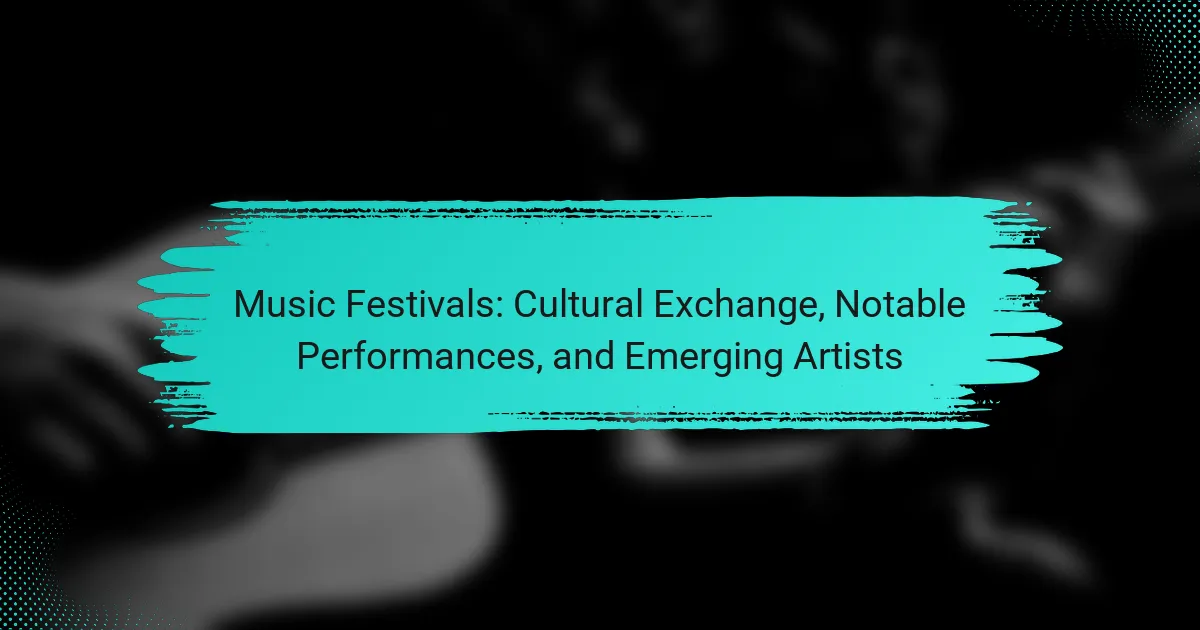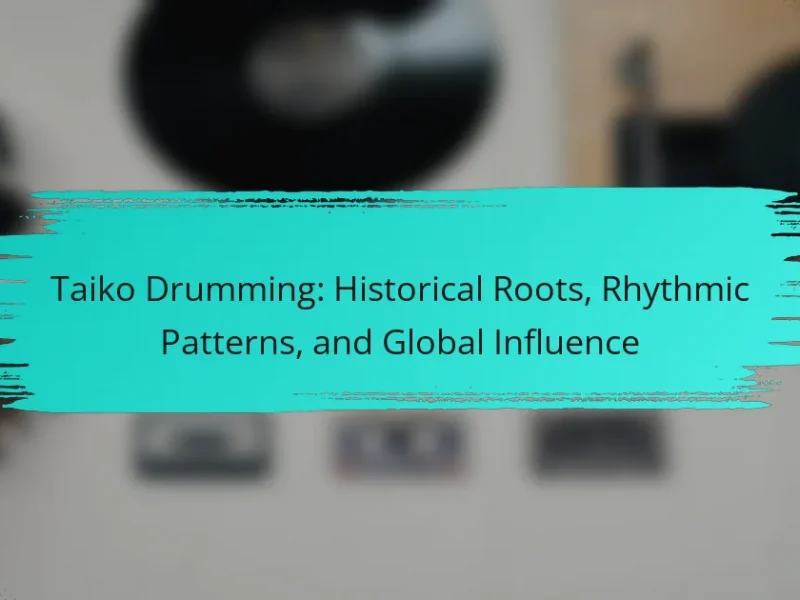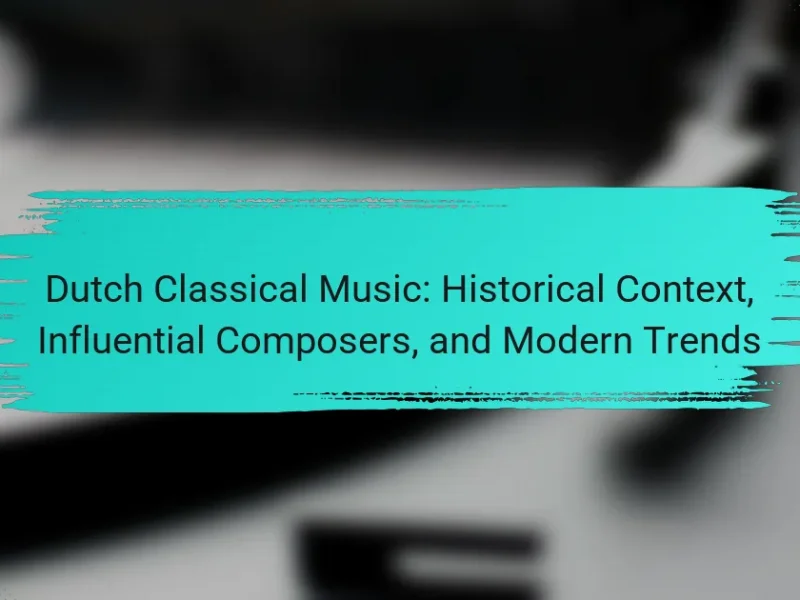Music festivals offer a unique opportunity for cultural exchange, showcasing diverse musical genres and fostering connections among artists and audiences. Notable performances throughout history highlight the cultural impact of these events. Emerging artists gain visibility alongside established acts, enhancing the music scene. Festivals also adapt to audience preferences, prioritize sustainability, and provide interactive experiences for attendees.
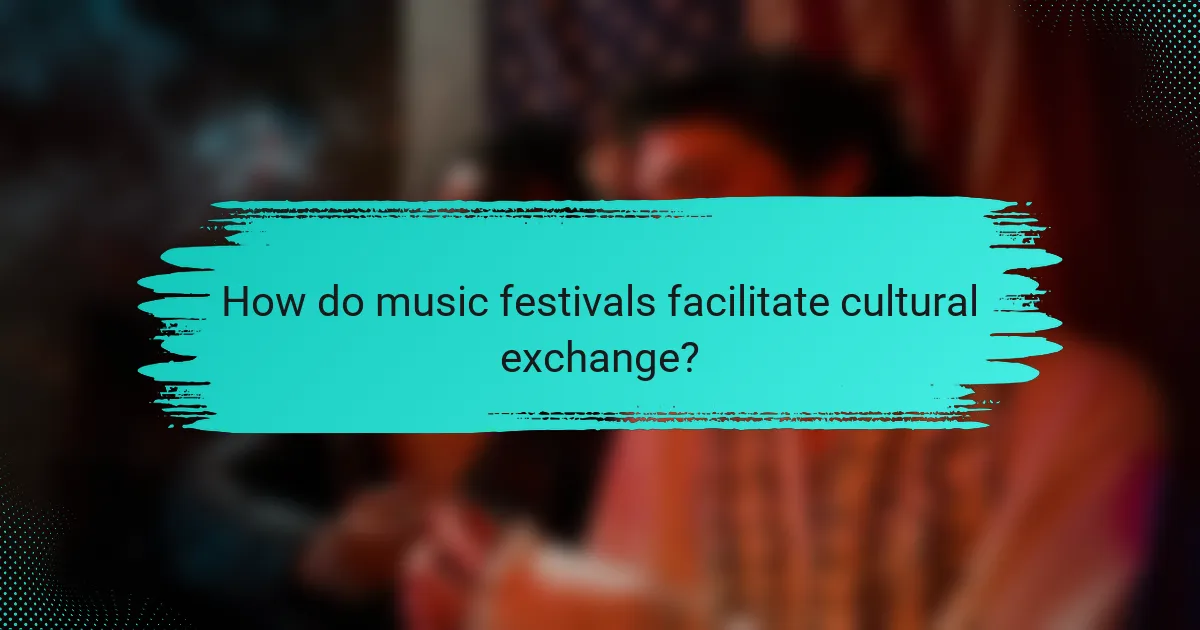
How do music festivals facilitate cultural exchange?
Music festivals facilitate cultural exchange by bringing diverse communities together through shared musical experiences. They showcase various genres, allowing artists from different backgrounds to collaborate and connect. This interaction fosters understanding and appreciation of different cultures. Festivals often feature workshops, discussions, and performances that highlight unique traditions, further enriching the cultural landscape. As a result, attendees gain exposure to new perspectives and ideas, creating a vibrant, interconnected community.
What role do international artists play in cultural diversity at festivals?
International artists enhance cultural diversity at festivals by introducing unique musical styles, traditions, and perspectives. Their performances foster cross-cultural connections and promote understanding among diverse audiences. For instance, festivals showcasing international acts often feature genres like Afrobeat, reggae, and folk music, enriching the overall experience. This cultural exchange not only highlights the root attributes of various musical traditions but also emphasizes the unique contributions of each artist, creating a vibrant tapestry of global sounds. As a result, audiences gain exposure to rare cultural expressions that might otherwise remain unrecognized.
Which cultural practices are commonly showcased at music festivals?
Music festivals commonly showcase cultural practices such as traditional dances, local cuisine, craft markets, and storytelling. These elements enrich the festival experience and promote cultural exchange among attendees. Additionally, many festivals feature workshops that highlight local art forms and music styles, fostering appreciation and understanding of diverse cultures.
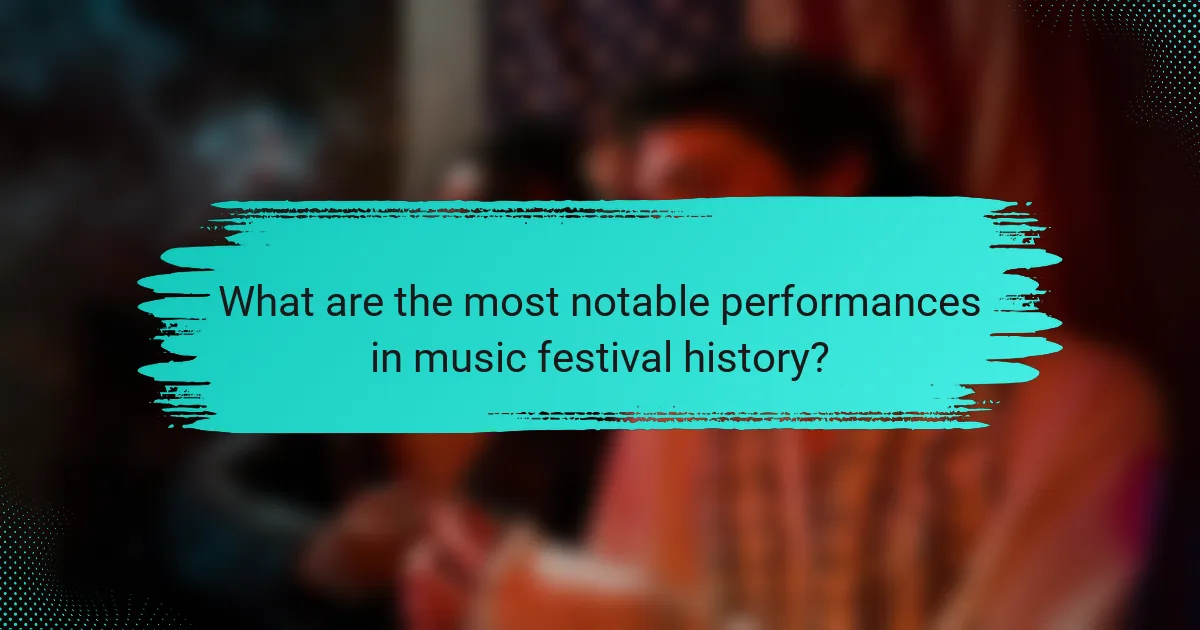
What are the most notable performances in music festival history?
Some of the most notable performances in music festival history include Jimi Hendrix at Woodstock in 1969, which showcased his iconic guitar skills. Another significant moment was Queen’s performance at Live Aid in 1985, where Freddie Mercury captivated the audience. The Coachella 2012 reunion of Dr. Dre and Tupac Shakur, featuring a hologram of Tupac, marked a technological milestone in live performances. Additionally, Beyoncé’s 2018 Coachella set, dubbed “Beychella,” celebrated Black culture and empowerment. These performances highlight the cultural impact and memorable moments that define music festivals.
Which performances have defined genres and influenced future festivals?
Notable performances have defined genres and significantly influenced future festivals. Iconic acts like Jimi Hendrix at Woodstock and Daft Punk at Coachella set new standards for live music experiences. These performances showcased innovative stage designs and unique soundscapes, inspiring countless artists and festival organizers. The impact of such performances resonates through festival lineups, shaping genres and audience expectations.
How do live performances impact audience engagement and festival success?
Live performances significantly enhance audience engagement and contribute to festival success by creating immersive experiences. Engaging performances foster emotional connections, leading to increased participation and memorable interactions. Festivals featuring notable artists often attract larger crowds, boosting ticket sales and overall revenue. Additionally, live music serves as a platform for emerging artists, promoting cultural exchange and diversity. This dynamic environment encourages social connections among attendees, further solidifying the festival’s reputation and longevity in the music scene.
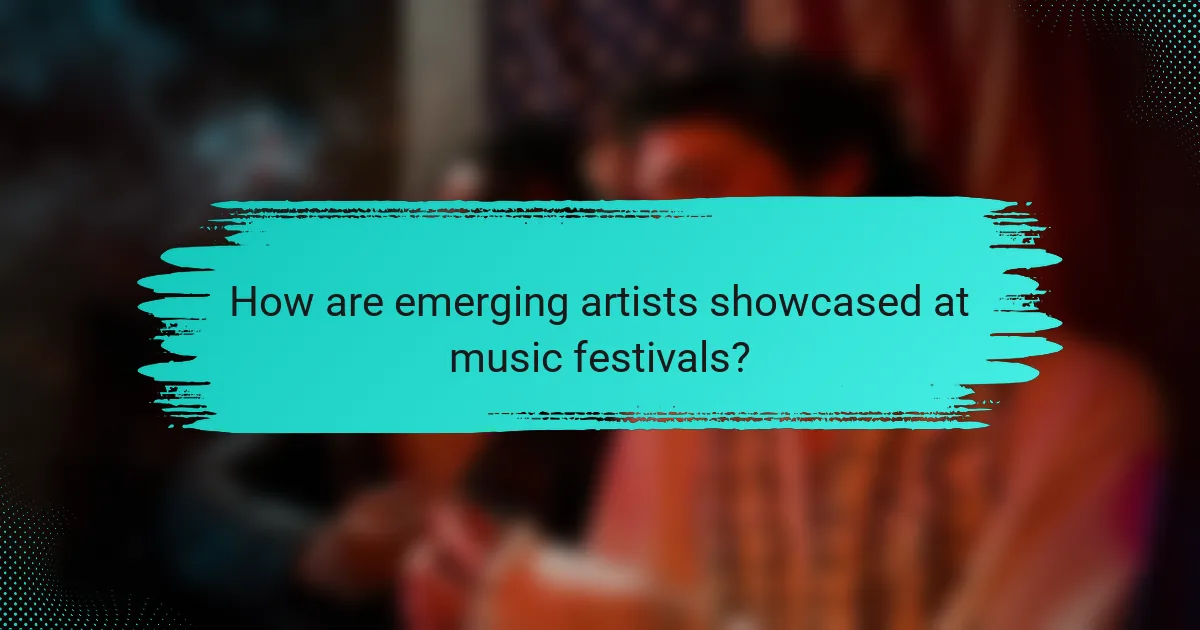
How are emerging artists showcased at music festivals?
Emerging artists are showcased at music festivals through dedicated stages, curated lineups, and promotional platforms. Festivals often include specific slots for new talent, allowing them to perform alongside established acts. This exposure helps artists gain visibility and connect with diverse audiences. Additionally, many festivals offer workshops and networking opportunities, fostering collaboration within the music community.
What platforms do festivals provide for new talent to gain exposure?
Music festivals provide platforms like live performances, networking opportunities, and social media exposure for new talent. These events often feature stages dedicated to emerging artists, allowing them to reach diverse audiences. Additionally, festivals may offer workshops and mentorship sessions, enhancing skill development and industry connections. Notable examples include South by Southwest (SXSW) and Coachella, which have launched numerous careers.
Which festivals are known for launching the careers of emerging artists?
Music festivals like SXSW, Coachella, and Glastonbury are renowned for launching the careers of emerging artists. These events provide platforms for new talent to gain exposure and connect with industry professionals.
SXSW features a diverse lineup, showcasing hundreds of artists across genres. Coachella is known for its high-profile performances, often leading to significant media attention for emerging acts. Glastonbury offers a unique cultural experience, emphasizing artistic collaboration and innovation, which can propel new artists into the spotlight.
These festivals not only celebrate established musicians but also prioritize discovering and promoting fresh talent. The exposure gained can result in record deals, increased fan bases, and opportunities for future performances.
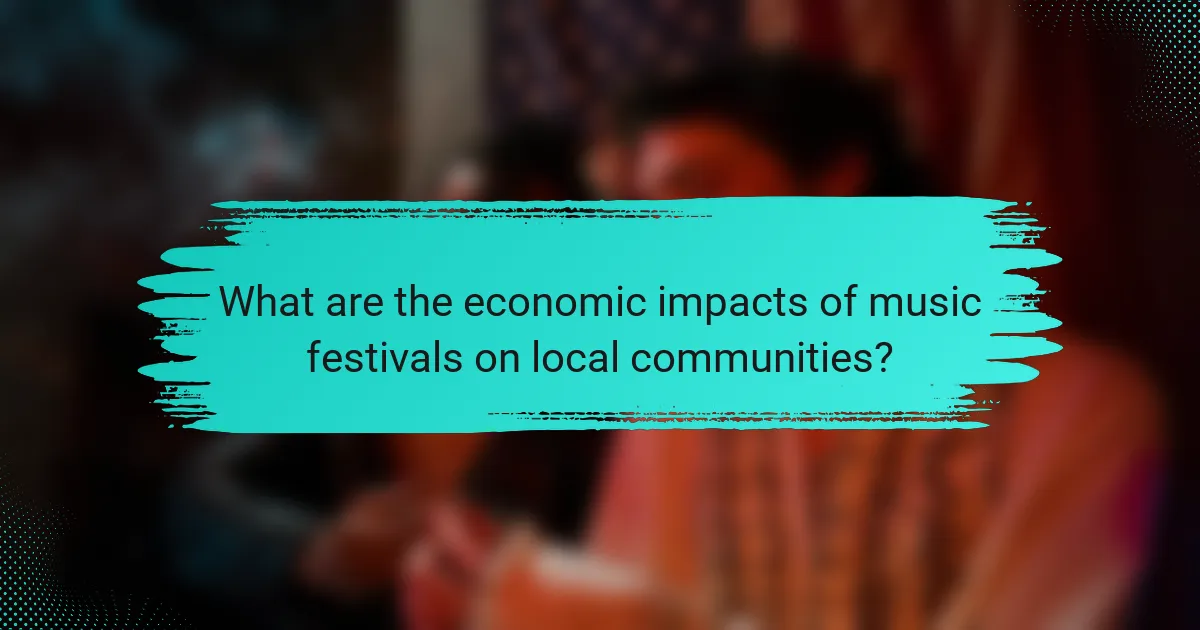
What are the economic impacts of music festivals on local communities?
Music festivals significantly boost local economies through increased tourism and job creation. These events attract visitors who spend on accommodations, food, and entertainment. For instance, a study found that festivals can generate up to $10 million in economic impact for host cities.
Additionally, music festivals promote cultural exchange, enhancing community identity and cohesion. They provide a platform for emerging artists, contributing to the local music scene’s growth. As a result, these festivals not only enrich local culture but also create sustainable economic benefits.
How do festivals contribute to tourism and local business growth?
Music festivals significantly boost tourism and local business growth by attracting visitors and fostering cultural exchange. They create economic opportunities for local vendors and artists. Festivals often feature notable performances and emerging artists, enhancing the cultural landscape. For example, a study found that music festivals can increase local revenue by up to 30%.
Which challenges do organizers face in balancing profit and community benefit?
Organizers face significant challenges in balancing profit and community benefit at music festivals. They often struggle to meet financial goals while ensuring positive local impact.
High operational costs, including artist fees and venue expenses, can pressure organizers to prioritize profit. This may lead to decisions that overlook community needs, such as local artist support or sustainable practices.
Furthermore, audience expectations for high-quality performances can conflict with the desire to promote emerging artists. Balancing these competing interests requires careful planning and stakeholder engagement to maintain cultural integrity while achieving financial viability.
Community feedback is crucial for understanding local concerns. Engaging with residents can help organizers create festivals that resonate culturally and economically, fostering goodwill and long-term success.
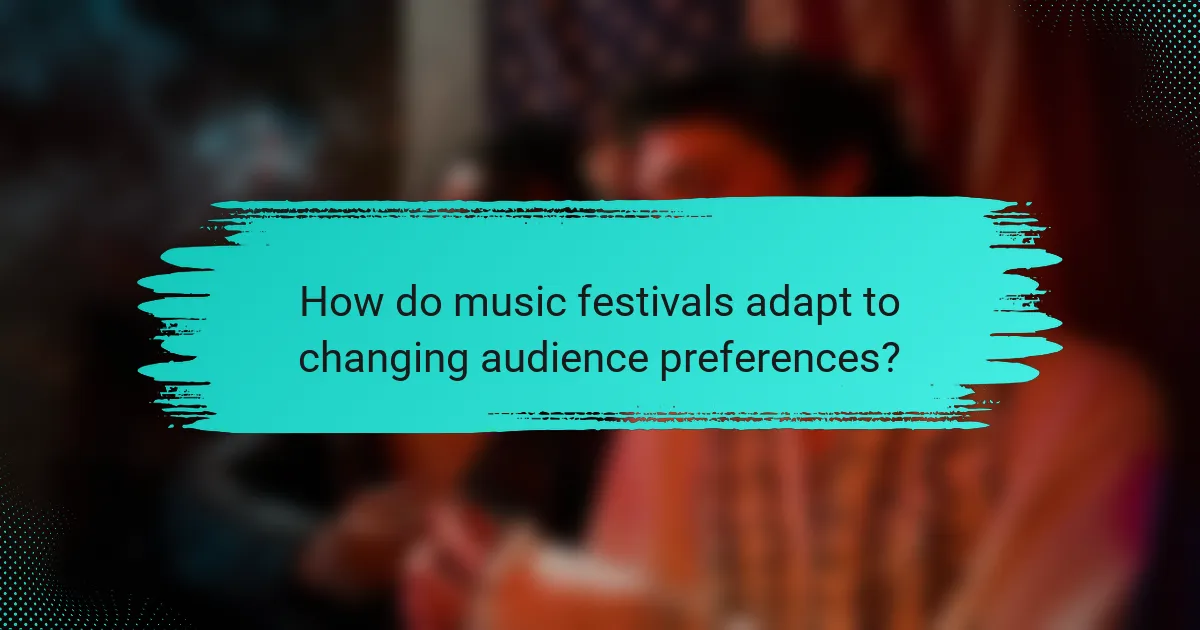
How do music festivals adapt to changing audience preferences?
Music festivals adapt to changing audience preferences by embracing diverse lineups, enhancing experiences, and leveraging technology. Festivals now feature a mix of genres, catering to varied tastes and attracting broader demographics.
Emerging artists gain platforms alongside established acts, fostering cultural exchange and innovation. Festivals increasingly incorporate interactive elements, such as mobile apps for scheduling and social media engagement, enhancing audience participation.
Sustainability has become a priority, with many festivals implementing eco-friendly practices, aligning with audience values. Data analytics helps organizers understand preferences, allowing for tailored programming that resonates with attendees.
In summary, music festivals evolve by diversifying their offerings, prioritizing audience engagement, and adapting to cultural trends.
What innovative technologies are being used to enhance festival experiences?
Innovative technologies enhancing festival experiences include virtual reality, augmented reality, and mobile apps. These tools improve engagement and accessibility for attendees.
Virtual reality allows users to experience performances in immersive environments, while augmented reality offers interactive elements that enrich the festival atmosphere. Mobile apps provide real-time updates, schedule management, and social networking features for attendees.
Additionally, RFID wristbands streamline entry and cashless transactions, enhancing convenience. Drones are increasingly used for aerial photography and crowd management, improving safety and capturing memorable moments.
These technologies collectively create a more interactive and enjoyable festival experience.
Which trends are shaping the future of music festivals?
Music festivals are increasingly shaped by cultural exchange, notable performances, and emerging artists. Diverse lineups promote global music styles, enhancing audience experiences. Sustainability trends focus on eco-friendly practices, while technology integration, like virtual reality, enhances accessibility. Additionally, collaborations between established and new artists foster innovation, attracting varied demographics.
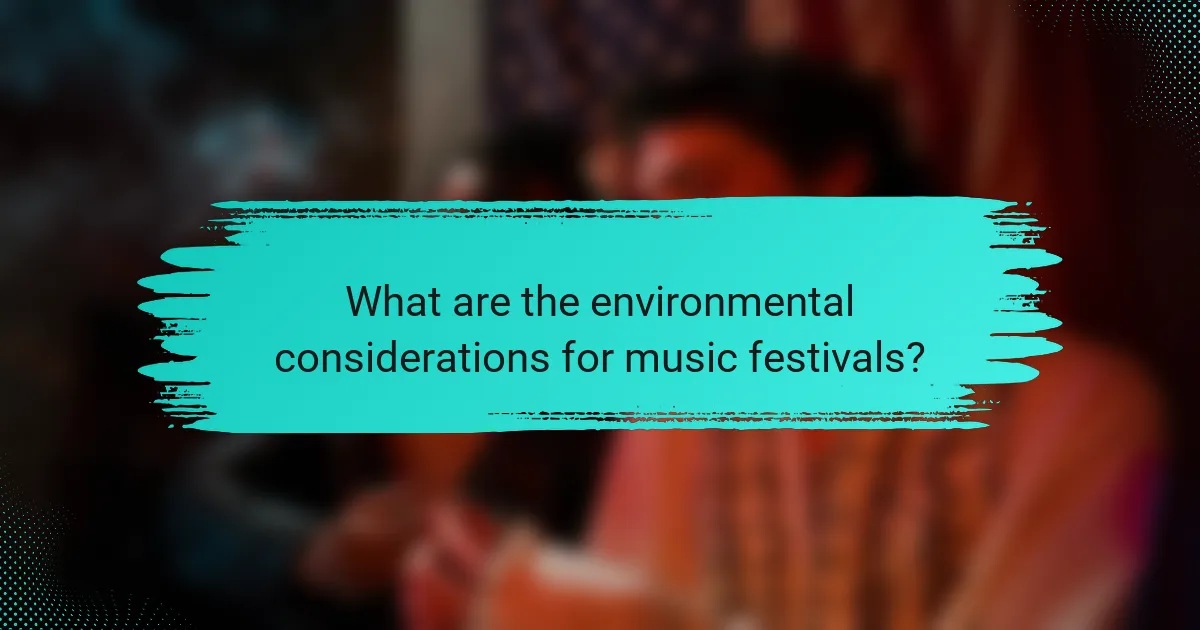
What are the environmental considerations for music festivals?
Music festivals often prioritize environmental sustainability through waste management, energy consumption, and local ecosystem protection. Many festivals implement recycling programs and use renewable energy sources. Additionally, they promote eco-friendly transportation options for attendees. Engaging local communities fosters cultural exchange while minimizing ecological footprints.
How are festivals implementing sustainability practices?
Music festivals are increasingly adopting sustainability practices to minimize their environmental impact. Many festivals implement waste reduction strategies, promote renewable energy, and encourage eco-friendly transportation options.
Festivals often use biodegradable materials for food and beverage vendors. They also set up recycling and composting stations to divert waste from landfills. For example, the Glastonbury Festival in the UK has a long-standing commitment to sustainability, aiming for a zero waste goal.
Additionally, some festivals partner with local organizations to offset their carbon footprint. They may invest in renewable energy sources, such as solar panels, to power stages and facilities. The Coachella Valley Music and Arts Festival has made significant strides in this area by utilizing solar energy.
Lastly, festivals promote sustainable practices among attendees by offering incentives for carpooling or using public transport. This not only reduces traffic congestion but also fosters a culture of environmental responsibility within the festival community.
Which festivals are leading the way in eco-friendly initiatives?
Several music festivals are leading the way in eco-friendly initiatives, including Glastonbury, Coachella, and Lollapalooza. These festivals implement sustainable practices like waste reduction, renewable energy, and local sourcing. Glastonbury, for instance, has a commitment to zero waste by using compostable materials and extensive recycling programs. Coachella promotes solar energy and encourages carpooling to reduce carbon footprints. Lollapalooza has adopted a comprehensive sustainability plan that includes water refill stations and eco-friendly merchandise. These efforts highlight a growing trend among festivals to prioritize environmental responsibility while enhancing the attendee experience.
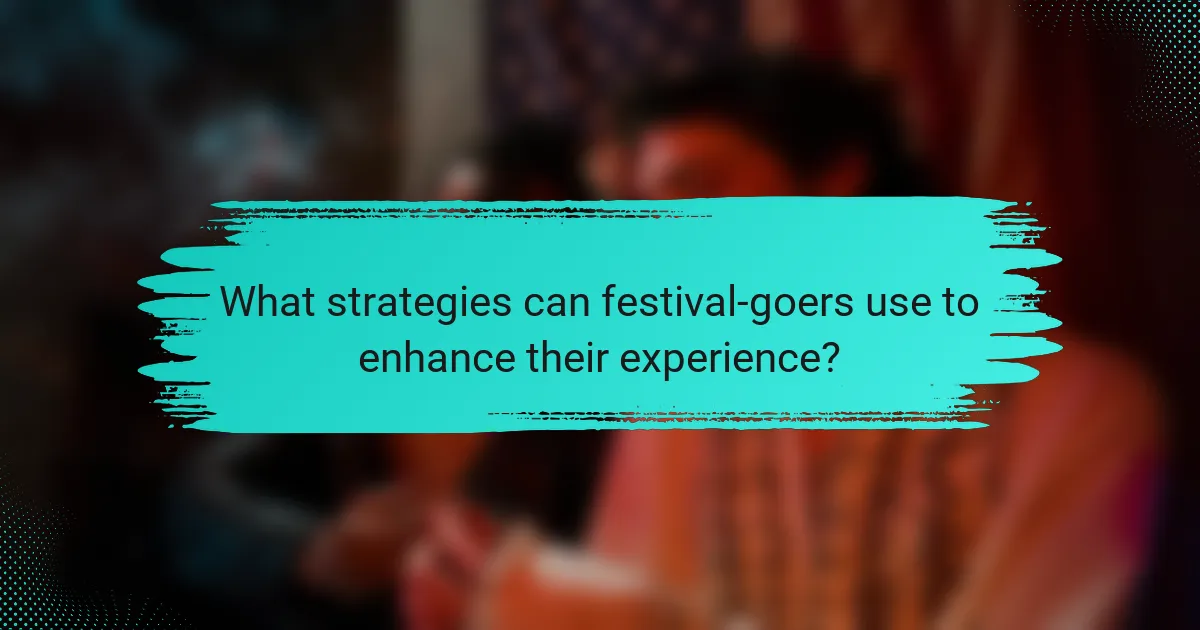
What strategies can festival-goers use to enhance their experience?
Festival-goers can enhance their experience by engaging with diverse cultures, discovering emerging artists, and participating in interactive activities. Exploring food stalls introduces local cuisine, while attending workshops fosters cultural exchange. Networking with fellow attendees can lead to shared musical discoveries. Prioritizing performances of lesser-known artists enriches the festival’s spirit and promotes new talent. Embracing spontaneity by exploring different stages creates memorable moments.
What are the best practices for planning a festival visit?
To plan a festival visit effectively, prioritize research, preparation, and flexibility. Start by selecting the festival that aligns with your musical interests and cultural experiences.
1. Research the lineup: Identify notable performances and emerging artists you want to see.
2. Create a schedule: Plan your days around key acts, but allow time for spontaneous discoveries.
3. Prepare essentials: Bring hydration, sun protection, and comfortable clothing.
4. Engage with the community: Participate in cultural exchanges and connect with fellow attendees.
These practices enhance your experience and ensure you enjoy the festival to its fullest.
Which common mistakes should attendees avoid at music festivals?
Attendees should avoid common mistakes like overpacking, neglecting hydration, and ignoring the schedule. These oversights can hinder the festival experience.
1. Overpacking: Bring essentials only to ensure mobility and comfort.
2. Neglecting hydration: Drink water regularly to stay energized and alert.
3. Ignoring the schedule: Plan performances to maximize enjoyment of notable artists.
4. Disregarding safety: Stay aware of surroundings and follow festival guidelines.
5. Poor communication: Use reliable methods to stay connected with friends.
6. Not respecting others: Be considerate of fellow attendees and the environment.
